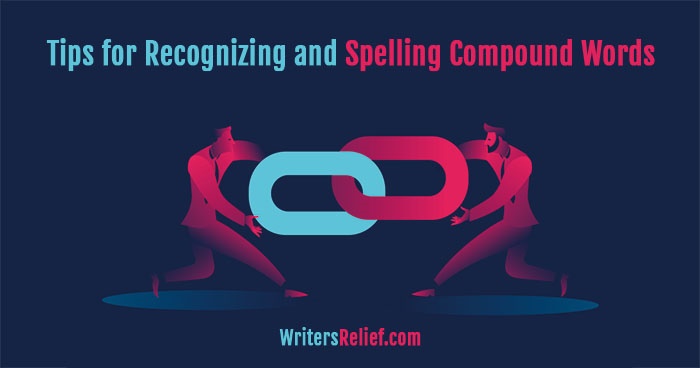
Updated November 2023
Knowing how to recognize and spell compound words can sometimes be tricky. Hyphen or no hyphen? One word or two? Here are some tips to help you correctly form compound nouns and adjectives:
Definition: A compound word is formed when two or more words join to form a new word that has its own meaning. Although compound words are often written as single words (such as teapot), sometimes they are not. That’s why it is important to understand that there are three types of compound words: closed compounds, hyphenated compounds, and open compounds. Let’s take a look at each of them:
Closed Compounds definition: compounds written as single words (newspaper, goldfish, highway)
Hyphenated Compounds definition: compounds that are hyphenated (mother-in-law, second-rate, court-martial)
Open Compounds definition: compounds written as separate words (end zone, high school, health care)
Sometimes knowing when to write compounds as single words, hyphenated words, or separate words is difficult. That’s because some compound words change their type based on their function in a particular sentence.
For example, when used as a noun, backup is written as one word: The police officer called for backup. However, when the same compound word is used as a verb, it is written as two words (back up): Did you back up your computer files? When used as an adjective, backup is one word: What is your backup plan for tomorrow evening?
Thus, the first tip for understanding how to write a compound word is knowing the word’s function in the sentence. Let’s take a look at a few more examples of this:
1. handout: As Jill was walking down the street, a man gave her a handout advertising a free concert in the park. (Here, handout is a noun.)
2. hand out: John handed out the flyers. (Here, handed out is a verb.)
3. upside down: The cake landed upside down. (Here, upside down is an adverb telling how the cake landed.)
4. upside-down: The upside-down poster announced a free concert in the park. (Here, upside-down is an adjective describing poster.)
When in doubt about the spelling of a compound word, you should first consult a dictionary, such as Merriam-Webster, which will list the appropriate spellings based on the word’s function in the sentence.
You will find, too, that many compound words are always spelled one way, regardless of their function. For example, according to Merriam-Webster, high school is written as two words regardless of whether it is used as a noun—Peggy has just started high school—or an adjective—Peggy is a high school student.
The confusion occurs when the compound word is not found in the dictionary. (Also see Commonly Confused Words and More Misused (and Mistreated) Words.) Then, writers need to rely on their judgment to ensure that their intended meaning is preserved.
Here are some tips to help you deal with compound words that are not in the dictionary:
1. Hyphenate the compound word if its meaning will be ambiguous without the hyphen.
Example: Dr. Lawrence, a small-town practitioner, was the first official to arrive on the scene. (Here, the hyphen is necessary; without it, readers may think that the practitioner was a small man, rather than a practitioner who works in a small town.)
2. Never hyphenate compound words that are created with -ly adverbs.
Example: Tammy and Bob bought the recently renovated house on Main Street.
3. Hyphenate the elements of a compound adjective that occurs before a noun.
Example: They attended a black-tie affair.
Note: The following kinds of compound adjectives almost always need to be hyphenated:
Noun + adjective (tax-exempt), Noun + participle (government-owned), Adjective + participle (friendly-looking), Adjective + noun + ed (high-priced)
The Bottom Line: Compound Word Rules Made Easy
Remember these points when working with compound words, and you should have no trouble with their spelling:
1. There are three types of compound words: closed compounds, hyphenated compounds, and open compounds.
2. If you are in doubt about the spelling of a compound word, you should check a dictionary before you apply any other guidelines.
3. Hyphenate if ambiguity will result without the hyphen.
4. Never hyphenate -ly adverbs.
NOTE: If compound words are still confounding you, Writer’s Relief can help. Since 1994, writers have been using our proofreading and formatting services to make sure their submissions are clean and professional—and grammatically correct!—giving their work its best shot at publication.
















A real problem in following these rules arises when you’re writing science-fiction and the word you want is not in the dictionary **YET**. Does the pilot of the spaceship (no hyphen) see the oncoming object on the view plate, the view-plate, or the viewplate? Does he shoot his ray gun, his ray-gun, or his raygun?
For most of these I tend to use the closed compound form, although my spell-checker dictionary often doesn’t agree When making up these new words I just have to go with what my ear tells me sounds best. I figure that by the year 2376 the hyphen, if it was ever there, will have vanished.
My five-year-old and I are trying to learn the rules for compound words. Apparently, there aren’t any. 🙁
Thank you, this website gave me more clarity.
question: Is “important” a compound word?
Hi Karen,
No, “important” is not a compound word.
Why isn’t message (mess + age) a compound word?
Hi Kelly,
The etymology of the word “message” comes from Old French, based on Latin missus, past participle of mittere (send). Just because you can find words within a word does not mean that it comes from a combination of those two words. In such a case, it is merely a coincidence.